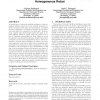Free Online Productivity Tools
i2Speak
i2Symbol
i2OCR
iTex2Img
iWeb2Print
iWeb2Shot
i2Type
iPdf2Split
iPdf2Merge
i2Bopomofo
i2Arabic
i2Style
i2Image
i2PDF
iLatex2Rtf
Sci2ools
GECCO
2009
Springer
2009
Springer
Evolution of functional specialization in a morphologically homogeneous robot
A central tenet of embodied artificial intelligence is that intelligent behavior arises out of the coupled dynamics between an agent’s body, brain and environment. It follows that the complexity of an agents’s controller and morphology must match the complexity of a given task. However, more complex task environments require the agent to exhibit different behaviors, which raises the question as to how to distribute responsibility for these behaviors across the agents’s controller and morphology. In this work a robot is trained to locomote and manipulate an object, but the assumption of functional specialization is relaxed: the robot has a segmented body plan in which the front segment may participate in locomotion and object manipulation, or it may specialize to only participate in object manipulation. In this way, selection pressure dictates the presence and degree of functional specialization rather than such specialization being enforced a priori. It is shown that for the g...
Agents’s Controller | Artificial Intelligence | Artificial Intelligence | Functional Specialization | GECCO 2009 |
Related Content
| Added | 26 May 2010 |
| Updated | 26 May 2010 |
| Type | Conference |
| Year | 2009 |
| Where | GECCO |
| Authors | Joshua S. Auerbach, Josh C. Bongard |
Comments (0)

